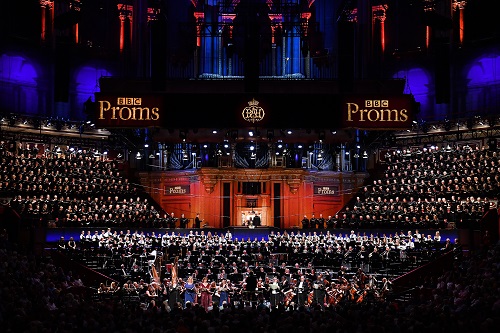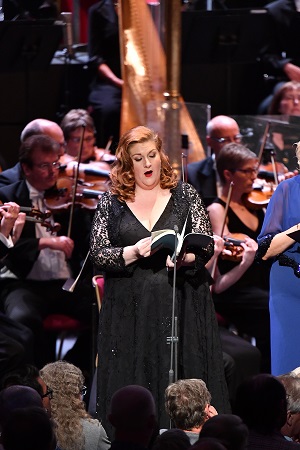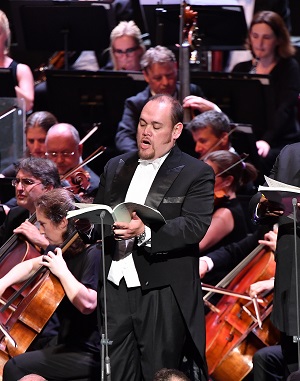Recently in Reviews
English Touring Opera are delighted to announce a season of lyric monodramas to tour nationally from October to December. The season features music for solo singer and piano by Argento, Britten, Tippett and Shostakovich with a bold and inventive approach to making opera during social distancing.
This tenth of ten Live from London concerts was in fact a recorded live performance from California. It was no less enjoyable for that, and it was also uplifting to learn that this wasn’t in fact the ‘last’ LfL event that we will be able to enjoy, courtesy of VOCES8 and their fellow vocal ensembles (more below …).
Ever since Wigmore Hall announced their superb series of autumn concerts, all streamed live and available free of charge, I’d been looking forward to this song recital by Ian Bostridge and Imogen Cooper.
The Sixteen continues its exploration of Henry Purcell’s Welcome Songs for Charles II. As with Robert King’s pioneering Purcell series begun over thirty years ago for Hyperion, Harry Christophers is recording two Welcome Songs per disc.
Although Stile Antico’s programme article for their Live from London recital introduced their selection from the many treasures of the English Renaissance in the context of the theological debates and upheavals of the Tudor and Elizabethan years, their performance was more evocative of private chamber music than of public liturgy.
In February this year, Albanian soprano Ermonela Jaho made a highly lauded debut recital at Wigmore Hall - a concert which both celebrated Opera Rara’s 50th anniversary and honoured the career of the Italian soprano Rosina Storchio (1872-1945), the star of verismo who created the title roles in Leoncavallo’s La bohème and Zazà, Mascagni’s Lodoletta and Puccini’s Madama Butterfly.
Evidently, face masks don’t stifle appreciative “Bravo!”s. And, reducing audience numbers doesn’t lower the volume of such acclamations. For, the audience at Wigmore Hall gave soprano Elizabeth Llewellyn and pianist Simon Lepper a greatly deserved warm reception and hearty response following this lunchtime recital of late-Romantic song.
Collapsology. Or, perhaps we should use the French word ‘Collapsologie’ because this is a transdisciplinary idea pretty much advocated by a series of French theorists - and apparently, mostly French theorists. It in essence focuses on the imminent collapse of modern society and all its layers - a series of escalating crises on a global scale: environmental, economic, geopolitical, governmental; the list is extensive.
For this week’s Live from London vocal recital we moved from the home of VOCES8, St Anne and St Agnes in the City of London, to Kings Place, where The Sixteen - who have been associate artists at the venue for some time - presented a programme of music and words bound together by the theme of ‘reflection’.
'Such is your divine Disposation that both you excellently understand, and royally entertaine the Exercise of Musicke.’
Amongst an avalanche of new Mahler recordings appearing at the moment (Das Lied von der Erde seems to be the most favoured, with three) this 1991 Mahler Second from the 2nd Kassel MahlerFest is one of the more interesting releases.
‘And there was war in heaven: Michael and his angels fought against the dragon; and the dragon fought and his angels, And prevailed not; neither was their place found any more in heaven … that old serpent … Satan, which deceiveth the whole world: he was cast out into the earth, and his angels were cast out with him.’
If there is one myth, it seems believed by some people today, that probably needs shattering it is that post-war recordings or performances of Wagner operas were always of exceptional quality. This 1949 Hamburg Tristan und Isolde is one of those recordings - though quite who is to blame for its many problems takes quite some unearthing.
There was never any doubt that the fifth of the twelve Met Stars Live in Concert broadcasts was going to be a palpably intense and vivid event, as well as a musically stunning and theatrically enervating experience.
‘Love’ was the theme for this Live from London performance by Apollo5. Given the complexity and diversity of that human emotion, and Apollo5’s reputation for versatility and diverse repertoire, ranging from Renaissance choral music to jazz, from contemporary classical works to popular song, it was no surprise that their programme spanned 500 years and several musical styles.
The Academy of St Martin in the Fields have titled their autumn series of eight concerts - which are taking place at 5pm and 7.30pm on two Saturdays each month at their home venue in Trafalgar Square, and being filmed for streaming the following Thursday - ‘re:connect’.
The London Symphony Orchestra opened their Autumn 2020 season with a homage to Oliver Knussen, who died at the age of 66 in July 2018. The programme traced a national musical lineage through the twentieth century, from Britten to Knussen, on to Mark-Anthony Turnage, and entwining the LSO and Rattle too.
With the Live from London digital vocal festival entering the second half of the series, the festival’s host, VOCES8, returned to their home at St Annes and St Agnes in the City of London to present a sequence of ‘Choral Dances’ - vocal music inspired by dance, embracing diverse genres from the Renaissance madrigal to swing jazz.
Just a few unison string wriggles from the opening of Mozart’s overture to Le nozze di Figaro are enough to make any opera-lover perch on the edge of their seat, in excited anticipation of the drama in music to come, so there could be no other curtain-raiser for this Gala Concert at the Royal Opera House, the latest instalment from ‘their House’ to ‘our houses’.
"Before the ending of the day, creator of all things, we pray that, with your accustomed mercy, you may watch over us."
Reviews

24 Jul 2018
Heavenly choruses - Mahler 8th at the BBC Proms
BBC Prom 11 Mahler Symphony no 8 in E flat major at the Royal Albert Hall, London, with Thomas Søndergård conducting the BBC National Orchestra of Wales and a huge cast. The nickname "Symphony of a Thousand" wasn't Mahler's choice but the invention of promoters eager to market it as a showpiece.
In music, quality comes before quantity, so many performances scale down the numbers for the sake of the music. But the Royal Albert Hall was created for extravagant choral spectaculars In this vast barn of a building, it's possible to do things with Mahler's 8th that couldn't be done elsewhere. Most of the 6000-strong audience will remember this Prom for years to come. For starters, the Royal Albert Hall is in itself a form of theatre: the dome, the atmosphere, the sense of communal anticipation and the sheer visual impact of seeing the choristers file into their places. All eight rows of the choir stalls were packed, with another row of singers above that still. Across the entire breadth of the hall, two rows of young singers dressed in white. And right at the heart, the Royal Albert Hall organ so majestic that it sustain the whole powerful experience.
With its unconventional structure and eclectic meaning, Mahler's 8th still remains perplexing for many. Why are the two parts so different ? How do they work? Nearly every good performsnce can offer insight. Under Søndergård, the BBC NOW is at a peak but the glory of this performance was built on the choral forces he had to hand - the BBC National Chorus of Wales (Adrian Partington, chorus master), the BBC Symphony Chorus (Neil Ferris) and the London Symphony Chorus (Simon Halsey) with the Southend Boys' Choir and Southend Girls' Choir (Roger Humphreys). Halsey was chorus master of the City of Birmingham Symphony Orchestra and of the Berlin Philharmonic before his present post, and Partington, one of the stalwarts of the Three Choirs Festival (which starts next weekend) has conducted Mahler 8 before, at Gloucester Cathedral. Thus the exceptional coherence in the singing : hundreds of individuals operating in unison, negotiating the swift changes with precision, keeping lines fluid and clean. In a symphony that predicates on images of illumination, this clarity is important. Most impressive of all was the stillness these massed voices managed to achieve in the quieter passages. Though the nickname "Symphony of a Thousand" predisposes listeners to expect overwhelming volume, the critical passages are marked by hushed refinement, the "poetical thoughts" of spiritual refinement. Hearing hundreds of voices singing quietly, tenderly and yet in unison was very moving. They even seemed to synchronize turning their pages.
 Tamara Wilson. Photo Credit: BBC/Chris Christodoulou.
Tamara Wilson. Photo Credit: BBC/Chris Christodoulou.
The First Part of this symphony is based on an ancient latin hymn about the Pentecost. Divine fire descends upon the Apostles, inspiring them to go forth on their mission to spread Enlightenment. Hence the direct attack with which "Veni creator spiritus!" was executed , creating an aural force field n which the soloists voices were embedded. Though the soloists - Tamara Wilson, Camilla Nylund, Marianne Beate Kielland, Claudia Huckle, Joélle Harvey, Simon O'Neill, Quinn Kelsey and Morris Robinson - stand at the front of the platform where they can be heard, they are primus inter pares - first among equals - operating as an extension of the chorus and orchestra.
In the Second Part of this Symphony, Mahler was inspired by Goethe's Faust, where Faust is redeemed by divine grace. The soloists are named but they operate as stages in the transformation,: they aren't acting out roles as if in an opera. Take the names too literally and miss the esoteric spirituality, where ego is sublimated for a higher purpose. The variety in the voice types reflects human diversity,. I liked the balance between O'Neill's earnest fervour and Kelsey's rich tone, anchored by Robinson's bass. These parts also operate in musical terms suggesting movement upwards and downwards, on simultaneous planes, also pertinent to meaning. The women's voices supply the Das Ewig-wiebliche, the "Eternal Feminine". This dichotomy between male and female, creator and muse, is central to Mahler's later work. The chorus of Blessed boys operates in parellel. "Wir werden früh entfernt von Lebenchören", They too, have been reborn by an act of faith, but how cheeky and childlike they are, like th child in Mahler Symphony no 4.
 Quinn Kelsey. Photo Credit: BBC/Chris Christodoulou.
Quinn Kelsey. Photo Credit: BBC/Chris Christodoulou.
The vocal music in Mahler's 8th inevitably draws attention, and deservedly so. Thus the absolute importance of the silence that follows the ecstasy with which the first part ends. It represents a transition, bridging the two disparate parts, cleansing away what has gone before, settingb the scene for what is to come. But in many ways, the whole Symphony pivots on the first part of the Second Part where the orchestra alone speaks. Søndergård approached it with restraint, letting the detail shine. Pizzicato figures suggest tentative footseps entering the new territory evoked by sweeping strings, called forward by horn and flutes. The Chorus and echo repeat the pattern, marking the transition. Throughout the symphony, details were respected, so individual instruments like flutes, celesta and harps could be heard despite the size of the forces around them. Some conductors achieve much more luminous purity, but Søndergård made the most of generous choral resources at his disposal, which played to the strengths of the Royal Albert Hall.
Anne Ozorio


